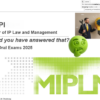Positioning for IP Experts: From Expertise to Recognized Authority
As the landscape of IP practice evolves, IP experts face a fundamental challenge: how to make their unique expertise visible, relevant, and trusted in a digital-first professional world. The new White Paper “Positioning for IP Experts”, available for download in preparation for the Experience Exchange at Weickmann & Weickmann on October 10, addresses exactly this challenge. It provides a comprehensive framework for transforming professional competence into strategic positioning and measurable business growth.
This White Paper is not just a guide; it is a roadmap. It connects reputation management, communication strategy, and business development into one coherent system. For patent attorneys, trademark practitioners, licensing professionals, and IP managers, it explains how to build a distinctive, credible position that attracts the right clients and converts expertise into long-term trust.
Here you get access to the white paper on Positioning for IP Experts:
White Paper Positioning for IP Experts
Send download link to:
Why Positioning Matters in IP
In today’s competitive IP market, credibility and consistency are no longer optional. Many experts offer similar technical services — filing, enforcing, valuing, or licensing IP. What differentiates successful professionals is how clearly they define their role in the market. The White Paper highlights four core realities that make deliberate positioning essential:
- Client decision-making has changed. Buyers of IP services research online, compare digital signals of expertise, and rely on social proof long before making contact. Positioning helps experts shape what these decision-makers find.
- Expertise must translate to business relevance. Clients seek results, not just processes. Positioning ensures that technical knowledge is communicated as a business enabler.
- Differentiation reduces price pressure. When professionals look interchangeable, procurement focuses on hourly rates. A distinct position protects value and strengthens perceived expertise.
- Focus scales trust. Consistency and specialization build reputation over time. The experts who solve similar problems repeatedly become the natural reference points in their domains.
Positioning, therefore, is not cosmetic. It is strategic infrastructure that connects visibility, credibility, and business results.
Core Principles of Positioning for IP Experts
The White Paper outlines nine principles that turn positioning from intuition into a repeatable structure:
- Service–Market Fit: Find the intersection between your expertise and verified client demand.
- Client Centricity: Frame your communication through the client’s goals and KPIs.
- Outcome Language: Speak in terms of results — market access, freedom to operate, leverage.
- Evidence Before Claims: Use proof, not adjectives. Case studies and metrics outperform promotion.
- Distinctive Expert Assets: Develop signature methods and visual cues that make you recognizable.
- Focused Exclusion: Define what you don’t do to sharpen clarity.
- Consistency and Cadence: Communicate rhythmically across all channels.
- Ethical Alignment: Let integrity and public responsibility define your trust capital.
- Measurement and Iteration: Track results and continuously refine your approach.
Each of these principles is actionable through the IPBA Connect and IP Business Academy platforms, where experts receive structure, templates, and feedback to professionalize their visibility.
Developing a Personal Positioning Strategy
Strong positioning is built step by step. The White Paper introduces tools such as the Positioning Canvas, a visual framework that helps IP professionals map their audience, define owned problems, and structure communication. It also includes:
- Audit & Choice: Review past mandates to identify natural strengths and recurring success patterns.
- Narrative Architecture: Learn to tell your story as a transformation — not just a service list.
- Content & Channel Plan: Use LinkedIn, the 📝IP Business Academy Blog, the podcast 🎧IP Management Voice, the digital IP lexicon 🧭dIPlex, 🖥️IP Business Talks, the newsletter 🎯IP Management Pulse and the 📃IP Management Letters as synchronized channels.
- Offer Ladder: Create structured offerings — from diagnostic workshops to strategic engagements — that show clear progression and value.
- Metrics & Review: Continuously evaluate visibility, engagement, and conversion.
This methodology turns abstract expertise into visible market authority.
Best Practices & Common Pitfalls
Positioning rewards discipline. The White Paper distils experience from dozens of successful experts within the IPBA ecosystem into clear best practices:
Best Practices: Start narrow, focus on evidence, co-create with your market, and maintain rhythm and coherence across all communication.
Common Pitfalls: Avoid being everything for everyone, mixing messages, or neglecting design and proof. Clarity, not breadth, builds trust.
The IPBA Connect and IP Business Academy infrastructure helps professionals avoid these pitfalls by coordinating publication, design, and analytics—turning consistency into a habit.
The IP Subject Matter Expert Model
At the core of the White Paper is the IP Subject Matter Expert model, the backbone of IPBA Connect. This model transforms individual expertise into collective visibility through synchronized design, publishing, and engagement.
Each IP Subject Matter Expert gains structured access to the IPBA ecosystem:
- 🧭 dIPlex — the digital lexicon and expert directory for discoverability
- 📝 IP Business Academy Blog — for case-based storytelling
- 🎧 IP Management Voice — for authentic, conversational visibility
- 📑 IP Management Letters — for reflective insights
- 🌱 Resource Hub — for personal enablement tools
- 🎯 IP Management Pulse Newsletter — for continuous visibility
This coordinated environment allows experts to focus on substance while the IPBA team manages production and distribution—creating measurable growth in credibility, reach, and engagement.
Future Trends and the Role of AI
The White Paper closes with a forward-looking perspective. Artificial intelligence accelerates information, but human experts curate meaning. In this hybrid future, discernment, synthesis, and ethics become the defining skills for thought leadership.
Experts who master data storytelling and visual communication will lead the next era of IP practice. Collaboration and transparency will become the new markers of reputation. Analytics will serve as the proof of visibility, trust, and influence.
Positioning is thus not a one-time exercise — it is a continuous process of alignment between evolving markets and enduring expertise.
Why IP Experts Should Read This White Paper
This publication is essential reading for anyone in the IP field who aims to:
- Strengthen their personal brand and become a recognized authority.
- Align their communication with client expectations and market needs.
- Build trust through structured, evidence-based visibility.
- Integrate their expertise into a measurable growth system supported by IPBA Connect and the IP Business Academy.
The White Paper delivers both inspiration and implementation tools — from strategic frameworks to checklists and glossaries. It is designed to help experts build reputation as deliberately as they build portfolios.
Further Reading: White Papers for the Weickmann & Weickmann Exchange
To prepare for the Experience Exchange, explore the series of related White Papers already available:
📌 International Business Development for IP Experts
👉 Read here
📌 Thought Leadership for IP Experts
👉 Read here
📌 LinkedIn for IP Experts
👉 Read here
📌 Personal & Expert Branding for IP Experts
👉 Read here
📌 Referral marketing (“Trusted, Not Touted”)
👉 Read here
📌 Business development archetypes
👉 Read here
📌 Networking: From Visibility to Qualified Conversations
👉 Read here
Together with the new White Paper on Positioning for IP Experts, these publications form the core preparation package for the discussion on digital visibility and business development for IP professionals at Weickmann & Weickmann on October 10 — a unique opportunity to learn, exchange, and shape the future of expert communication in the IP ecosystem.
New White Paper in 2026
Digitally Real: Authentic Visibility Without Performing explores how authenticity can become a systematic capability in digital IP business development and how the “human factor” can be brought back into professional visibility. This white paper also serves as the conceptual preparation for the Experience Exchange in Berlin on 24 March.



